When I didn't speak the language of games
My uncle introduced me to video games around the 2000s. He wasn’t an avid gamer, but he did have a Sony PlayStation 1 for his daughters - my older cousins - and he also dabbled in some PC games. I would run over to his house, load up titles like Crash Bandicoot and Resident Evil 2 on PS1, or maybe Deus Ex or Serious Sam on PC. Crucially, many of these games were in English, despite the fact I didn’t live in an English-speaking country, nor did I speak the language
And I think that formed the way I engage with video games as a medium. Games are hard to play if you don’t really know what the rules are, or what everyone around you is saying, or what your objectives are. But they’re also a lot more mysterious. They’re foreign, by definition. Almost magical.
It’s that sense of alien wonder that I came to associate with games which connect with me the most - that sense of wonder when you understand what the next steps are, or what some mechanic is.
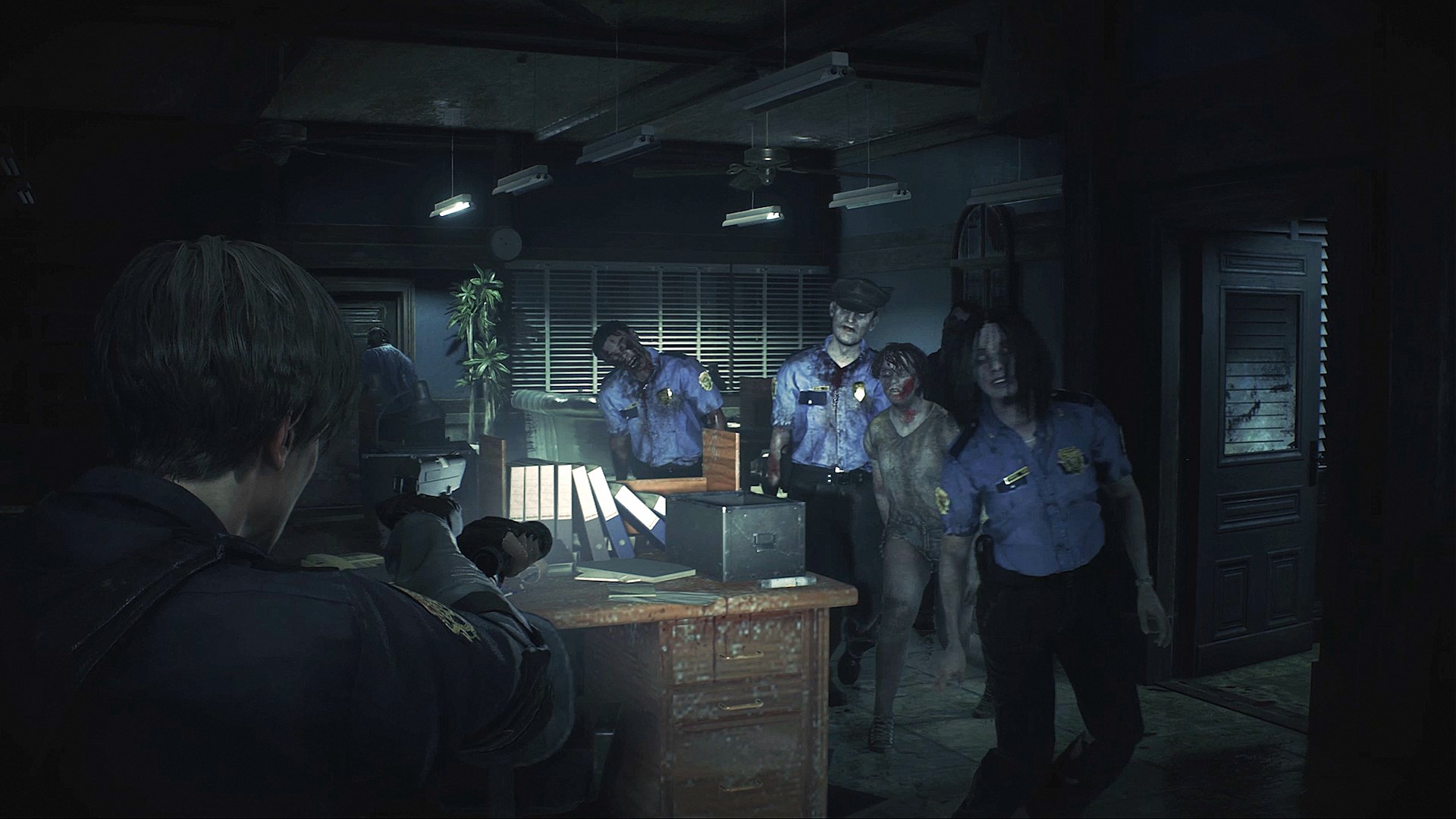 Resident Evil 2: Yeah, I didn’t really know what was going on. Screenshot of a remake, because that’s what the game felt like to play back in 1998.
Resident Evil 2: Yeah, I didn’t really know what was going on. Screenshot of a remake, because that’s what the game felt like to play back in 1998.
I loved my time with Resident Evil 2 - but I’ve never gotten out of the police station: the echoing footsteps, the sudden lurch of a zombie, the unintelligible shouts - I was terrified. I didn’t know why I was in a police station, or where the zombies came from. I didn’t understand how the puzzles work, and I’d routinely run out of bullets because I didn’t think of a strategy to run away and dodge the ever-present threats.
I played and loved Deus Ex, and I didn’t really understand what the game was about - and I didn’t really care for that either. I had so many tools in that sandbox and I would go to town methodically eliminating enemies, failing, and dying when trying to go guns blazing. Playing as JC Denton was cool, that’s all I needed to know.
To this day, I have warm memories of New York’s Battery Park from one of the game’s missions - and I make the midnight trek down to the park every time I find myself visiting Manhattan. Even the subway rats bring me back to my experience playing Deus Ex.
And I only had the faintest idea what either Return to Castle Wolfenstein or Medal of Honor: Allied Assault were about. Swastikas were probably a hint in the right direction, but maybe I wasn’t a very bright kid.
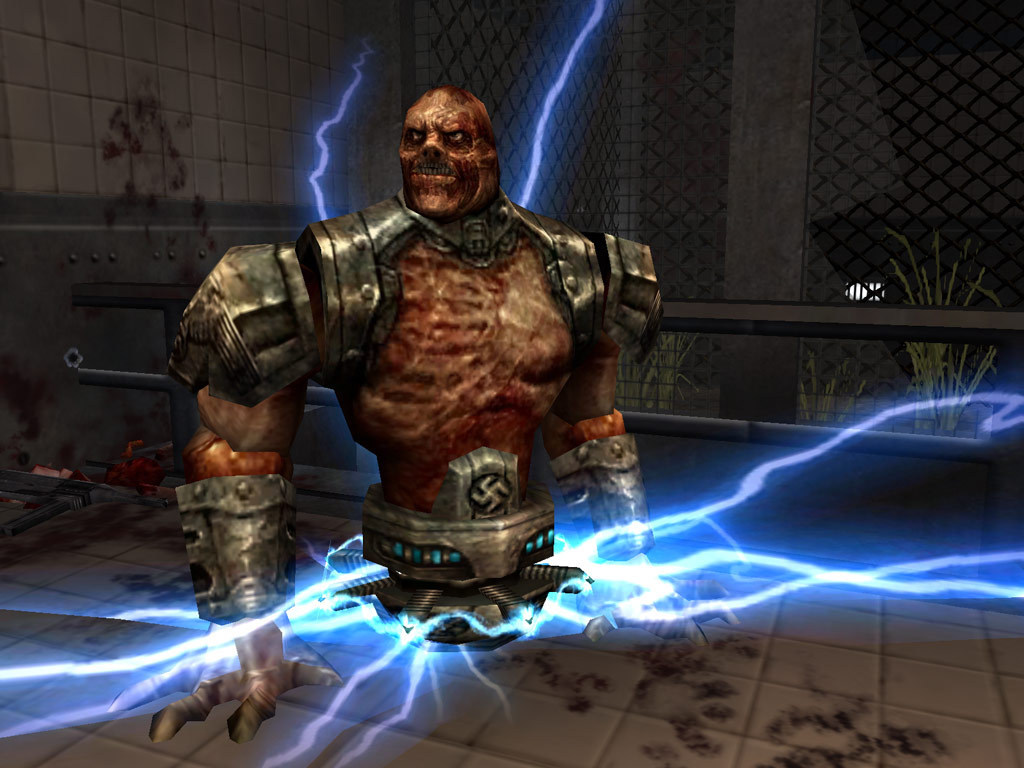 Return to Castle Wolfenstein: I didn’t really understand what was going on. From looking at the screenshots now - I wasn’t a very bright kid.
Return to Castle Wolfenstein: I didn’t really understand what was going on. From looking at the screenshots now - I wasn’t a very bright kid.
I could only spend so much time playing video games at my uncle’s house, so my imagination would run wild in the spare time - filling in the details, crafting theories, and just imagining the possibilities (“wouldn’t it be cool if…”).
Hidetaka Miyazaki, creator of the Dark Souls series, grew up an avid reader, but many of the English fantasy and sci-fi books he had access to were beyond his full comprehension. He relied on illustrations and words he understood to piece together a story in his mind: a direct inspiration for the often convoluted, enigmatic storytelling of these games - relying on a player’s determination to seek out story beats and their imagination to fill the gaps. It shows, and I’m a huge fan of Soulslike games for this very reason.
Other modern games aim to capture a similar feeling. Tunic is straight-up a game about playing a game with a manual written in a foreign language - with its pages scattered across the game’s world. Less subtly, Chants of Senaar is a game about interpreting a foreign language - being dropped in a world where you can’t understand the inhabitants.
I eventually inherited the PS1 once my uncle’s daughters became more interested in social life and boys over video games - their loss. At some point my mom caved to all the nagging and bought a modest gaming PC too.
I played Need For Speed: Most Wanted and it was cool driving cars and vibing in the city. Hitman: Codename 47 protagonist was unnerving, but the puzzles around orchestrating assassinations and the thrill of getting away with it were awesome. I spent months playing Diablo II, not knowing about optimized builds or considering progression. I just picked cool powers and whacked monsters on the head with an axe.
I think a huge element of why playing these games was so meaningful in a unique way for the time (besides these being my formative years, of course) was my lack of familiarity with gaming convention. I couldn’t yet decipher how game mechanics worked, and I didn’t really think of games in terms of breaking them down into systems. There was magic and wonder. I didn’t think “oh, that’s a shooter, so it’s not going to have X in it” or “giving players access to Y would destroy the game’s balance, so there’s clearly no way to obtain it”.
Was it all just about the more difficult access to knowledge and lack of familiarity with gaming as a medium? I don’t think so.
When I was in middle school, I picked up The Elder Scrolls III: Morrowind, which turned my world upside down.
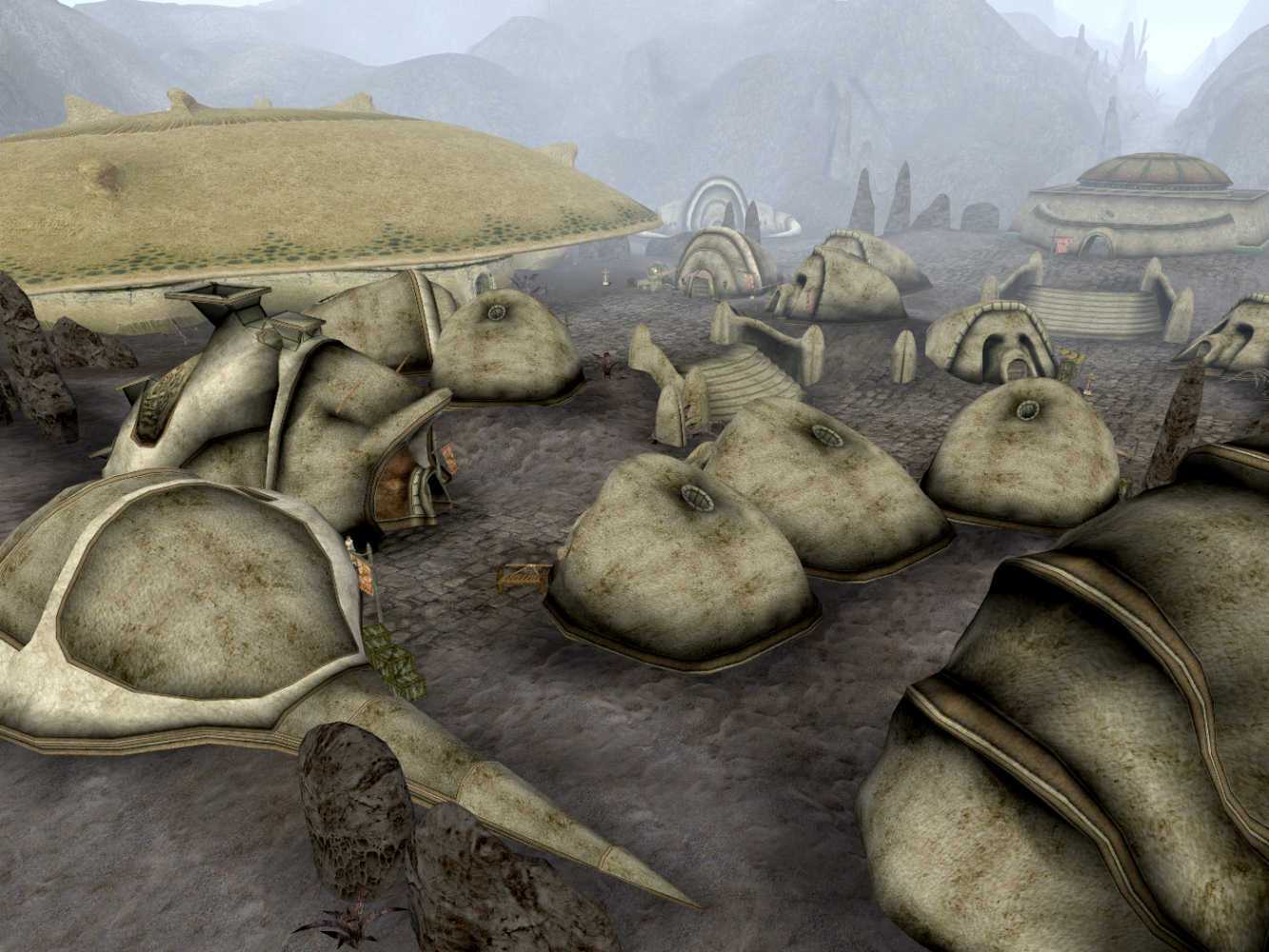 Morrowind’s weird and fascinating world is built upon a millennia of deep lore. This is Ald’ruhn, a city built out of giant crab shells - now extinct, probably because of all this crab-building.
Morrowind’s weird and fascinating world is built upon a millennia of deep lore. This is Ald’ruhn, a city built out of giant crab shells - now extinct, probably because of all this crab-building.
When I wasn’t playing, I’d talk about the game to my classmates, or print out all of the UESP Wiki pages for the game. I became obsessed. The mechanics felt limitless - you could interact with every item, move every object. Dialog trees felt like they hid volumes upon volumes of knowledge and lore. The morbid Ashlander culture, the Tribunal, Daedric cults - it all fascinated me.
Oh, and in hindsight I played a pirated, poorly translated copy of the game. All the audio and much of the text was in English - and Morrowind’s extensive lore and my desire for understanding it contributed to my study of the language.
Yes, I was a teenager, and it was easy to obsess over things. But there’s also something to be said about how much the world truly pulled me in. I was no longer ignorant of the plot and context like I was when playing Resident Evil 2 - I was now obsessively studying the Tribunal and Daedric cults. This was a new kind of magic - magic of immense, intricate world building. Instead of being a lost explorer, I became a scholar of the world: I no longer simply inhabited the magic world - I studied it.
Through my obsession with Morrowind, I started understanding how games work; I started diving deep into lore and mechanics. I perused the wiki and studied how hit chance is implemented, read about quests I couldn’t get to myself, and even started playing around with The Elder Scrolls Construction Set - a modding engine which shipped with the game.
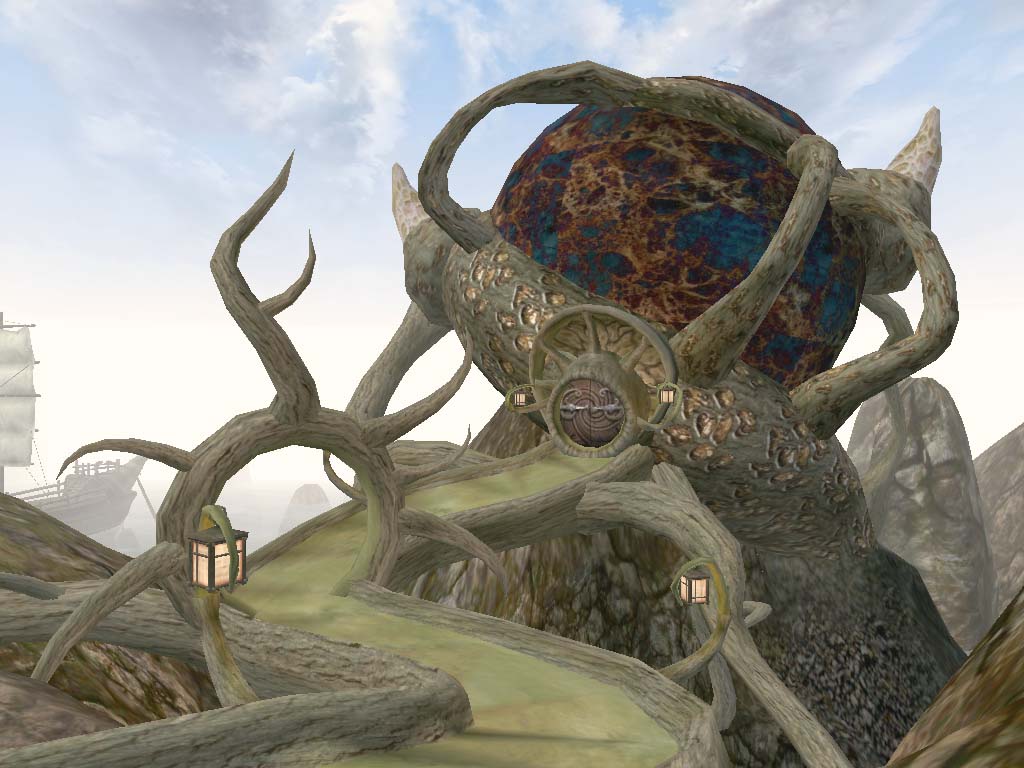 I’ll just keep showing Morrowind’s weird architecture. Here’s a Telvanni Counicl House. Grown over centuries by some very stuck-up wizards.
I’ll just keep showing Morrowind’s weird architecture. Here’s a Telvanni Counicl House. Grown over centuries by some very stuck-up wizards.
Time passed - I learned English - the primary language of video games and computers in general. Knowing English - both the language as well as the culture (yeah-yeah, the Anglosphere is not homogeneous - but there’s a large degree of shared context and understanding) - helped me understand the games I play more, because even localized games rely on implicit lingual and cultural context.
I learned to code, being able to build some basic games myself. With that came an even further appreciation for game systems, how they’re implemented, and the work that goes into making those systems fade into the background as the player gets absorbed by the game.
The way I engaged with games changed. I appreciate well built games, I appreciate novel ideas, and I appreciate how game systems interconnect. I enjoy when a game cleverly subverts my expectations, or uses established gaming convention to do something new. It’s fun watching games innovate by marrying different mechanics in creative ways - and it’s engaging to be familiar with the inspirations for such creative game makers.
But I also think a big part of why I continue to enjoy games so much is because I never stopped learning about them. In the age of rapid access to shallow information - with the rise of YouTube, Wikis, and soon ever-present AI assistants - the barrier to look something up is very low.
Looking back, it feels less like losing magic and more like learning a second language. For years, I was fluent only in the native tongue of wonder. I understood games through pure feeling, through the mystery of the unknown, the way a child understands the world (no doubt actually being a child helped). The rules were obscure and the context was missing, but the emotional message was clear.
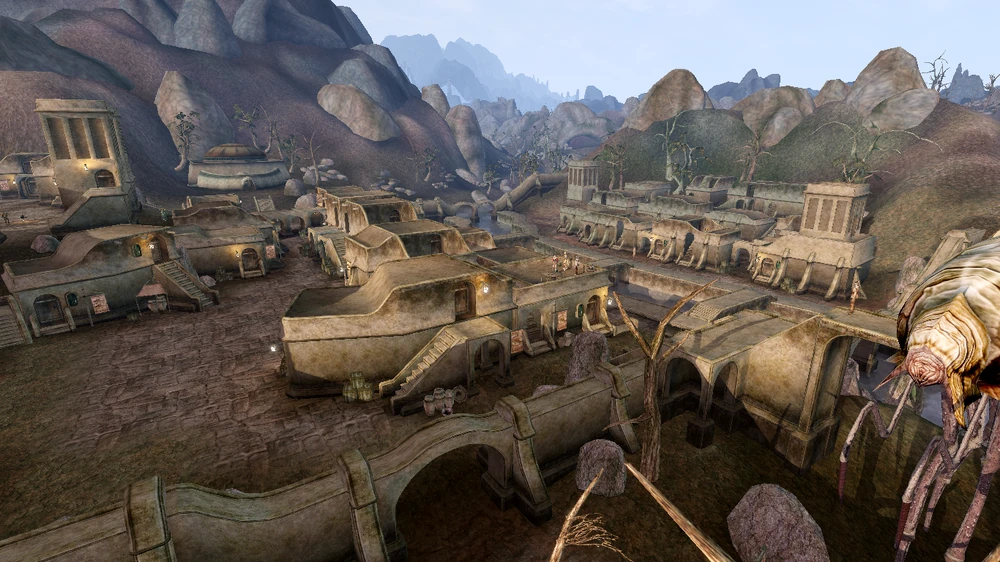 Last screenshot of Morrowind - I promise - the iconic city of Blamora. If you’ve played it - this should hit you right in the feels. If not - it’s fine to carry on.
Last screenshot of Morrowind - I promise - the iconic city of Blamora. If you’ve played it - this should hit you right in the feels. If not - it’s fine to carry on.
But learning English, learning to code, and studying game design taught me the language of craft. It’s the language of interconnected systems, of balance, of narrative structure, and engine limitations.
For a while, I got completely lost in this new way of engaging with games. There was a danger in seeing only the blueprints, in reducing every magical world to a set of mechanics and feedback loops. The magic didn’t just fade, it felt like I was systematically dismantling it.
That’s something I really struggled in with the horror games - yes, playing through Penumbra or Amnesia series can be a heart-pounding cold sweat inducing experience. But once you dissect the experience - understand monster patrol routes, or identify event triggers - the carefully constructed dread collapses.
Now, I can appreciate a game on both levels. I can still be swept away by the raw, untranslatable feeling of a world, but I now also get to marvel at the elegance of its design. Think Outer Wilds - one of my favorite games of all time. There was the childlike awe of discovering each planet’s secret, a raw feeling of wonder. But there was also the deep thrill of seeing how each secret was a perfectly placed cog in the game’s narrative. It was a beautiful moment where both languages spoke at once.
Maybe that’s the way we all learn to keep finding magic in the world, long after the mysteries of childhood have been solved. Or maybe I’ve just been feeling poetic and spent too much time reflecting on my childhood since the day my kiddo was born.
Comments
Respond directly on Bluesky (threads shown below) or Medium (view comments there).
 Rooslawn's Unmapped Worlds
Rooslawn's Unmapped Worlds